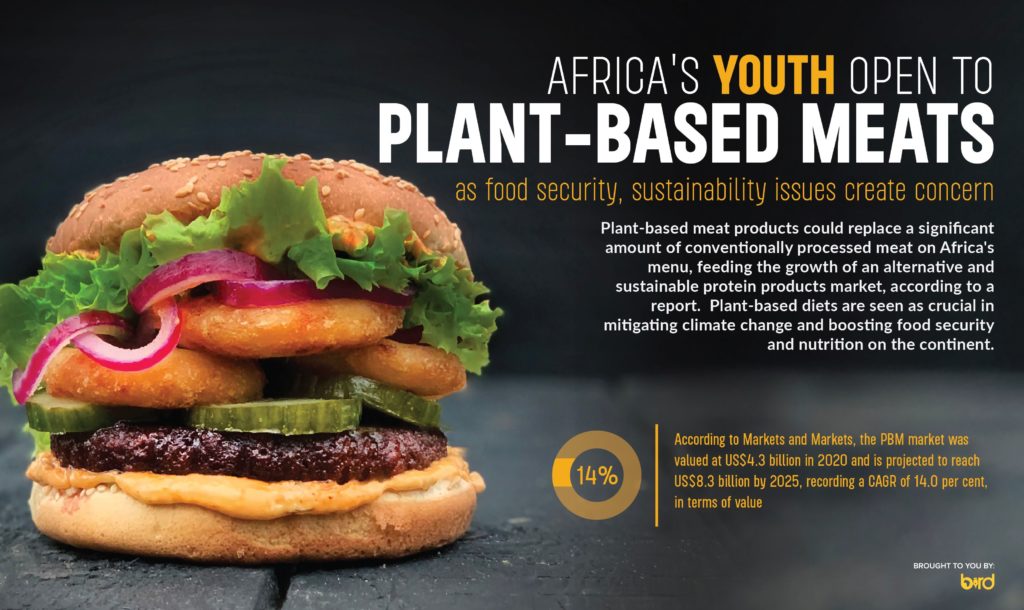Plant-based meat products could replace a significant amount of conventionally processed meat on Africa’s menu, feeding the growth of an alternative and sustainable protein products market, according to a report. Plant-based diets are seen as crucial in mitigating climate change and boosting food security and nutrition on the continent.
by Seth Onyango, bird story agency

Changing taste preferences among Africa’s big consumers is driving plant-based diets mainstream in Africa as diners become more conscious about their health and climate.
US-based North Mountain Consulting Group and South Africa’s Credence Institute study show Kenya, Nigeria and Egypt have the continent’s biggest appetite for vegan meat.
It further found that Gen Z and millennial age groups (18-39 years) have developed the biggest taste for PBM in the three African states.
“Although not currently familiar or widely adopted, consumers in Kenya and Nigeria were quite open to trying and purchasing PBM (about three quarters of Kenyans and Nigerians were highly likely to try and buy)” states the report in part.
“Consumers in Egypt were also quite open to PBM (about half were highly likely to try and buy), but less so in comparison to Kenya and Nigeria. Health and food security were the most important motivations and were statistically significant predictors of purchase intention across all countries.”
Plant-based meats are made from plants and manufactured to feel, taste, and appear like real meat.
PBMs are deemed healthier than regular meat as they’re lower in saturated fat and calories, with ingredients including coconut oil, vegetable protein extract, and beet juice.
They are also rich in micronutrients, such as zinc, iron, and calcium making them an obvious choice for health-conscious diners.
In Kenya, Nigeria and Egypt, the most important reason for eating meat was lifestyle habits.
“In all three countries, the most important reasons for eating meat included: part of their usual meals or recipes, important for their health, and taste. Culture and religion were the least important reasons for our panels in Kenya and Nigeria, but were slightly more relevant in Egypt,” the Credence Institute report found.
Beef, chicken, and fish were the most regularly consumed types of meat in all countries.
According to Markets and Markets, the PBM market was valued at US$4.3 billion in 2020 and is projected to reach US$8.3 billion by 2025, recording a CAGR of 14.0 per cent, in terms of value.
It is witnessing significant growth due to the growing vegan and flexitarian population across the world, raising awareness about the health benefits offered by plant-based meat over animal meat, and growth in government initiatives along with significant investments are driving the global market.
“The sales of plant-based meat can be increased by adopting marketing strategies such as diversification and segmentation. The objective is to create more demand among consumers, such as health-conscious consumers, vegetarians, flexitarians, and vegans. Along with this, it is crucial to position the product at the right place through the right sales channel,” the M&M report states.
Amid rapid population growth in Africa, PBM is expected to help cut beef-related emissions on the continent and boost its nutritional outcomes.
“This expected growth in meat consumption will pose significant challenges for the local food economies in Africa,” the Credence Institute assesses.
“Food insecurity in Egypt, Kenya, and Nigeria is still high, with 27.8 per cent, 68.5 per cent, and 57.7 per cent of the population respectively experiencing moderate or severe food insecurity in the period between 2018 and 2020.”
Studies show the meat and dairy industries create 7.1 gigatons of greenhouse gases annually or about 14.5 per cent of total man-made emissions.
Conversely, plant-based meat emits 30–90 per cent less greenhouse gas than conventional meat (kg-CO2-eq/kg-meat) according to Good Food Institute.
Worldwide, animal agriculture contributes more to climate change than exhaust emissions from the entire transportation sector.
It is important to note, however, that traditional African meals are already vegan top being yam and vegetables, Ghanaian beans and plantains, South African pap and chakalaka, and the Kenyan chapati, ugali and vegetable stew.
These everyday African meals contain no meat, dairy, or eggs. Similarly, many traditional Ethiopian dishes are vegan.
bird story agency




